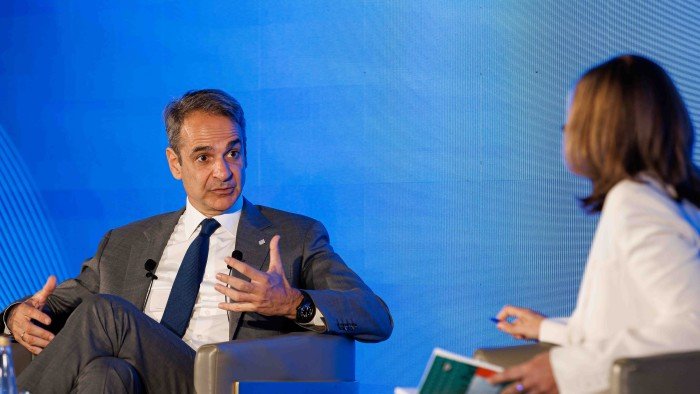Unlock the Editor’s Digest for free
Roula Khalaf, Editor of the FT, selects her favourite stories in this weekly newsletter.
Greek Prime Minister Kyriakos Mitsotakis opened the door to a shift in policy that could see the country develop nuclear energy for the first time as part of its energy transition strategy.
Mitsotakis said Greece “should be prepared to join the nuclear alliance”. Although he cautioned that no immediate steps were planned, he emphasised the importance of being “part of the conversation”.
“This may come as a shock to some of those listening to us, given that Greece is a country that has no background or experience in nuclear energy,” he told the FT-Kathimerini Energy Transition summit in Athens. “But when I look at the overall energy developments, I see no way for the world to get to carbon neutrality without nuclear.”
He also proposed nuclear energy for cutting emissions from shipping, where Greece is a global player. “This, of course, is a discussion that I’m very open to have with the shipping community, and to ensure that we create a common working group that is going to look at this technology at least as an option.”
Nuclear energy has long been resisted in Greece, in large part as a result of the fallout from the 1986 Chornobyl disaster. The explosion at the Soviet-era nuclear plant caused significant radioactive contamination, which continues to be associated with severe health hazards in its population.
Germany recently dropped its long-held opposition to nuclear power under the new government led by Chancellor Friedrich Merz, building on a rise in support for nuclear energy since gas prices soared following Russia’s full-scale invasion of Ukraine.
Mitsotakis noted thar Greece had almost eliminated lignite coal from its energy supply, one of the most “insufficient and dirty” forms of energy, after making a deliberate policy choice since his government took office in 2019. Coal now accounts for just 5 per cent of electricity production, he said, and half of Greece’s power was renewable, drawn from its abundant solar and wind.
“We’re slightly biased towards solar, so I would like to see more wind. Offshore wind is a big potential, and of course, we invest heavily in [energy] storage,” he added.
Mitsotakis went further to urge the EU to take a strategic approach to energy and plan with a 10-to-15-year horizon, as well as addressing inequities in the electricity market that had driven up costs in Greece and Italy.
Separately, Mitsotakis said he was “extremely concerned” about the escalation of the Israel-Iran conflict, where there “doesn’t seem to be a clear off ramp”.
The adverse consequences of a war spilling over in the Middle East region for the global, economy, trade and shipping sectors were significant, he added, and could lead to even higher inflation. About 180 ships with Greek flags in the Gulf were being monitored, he said.
But he ruled out Greece’s involvement in any escalation in military activity that might draw in the US and its allies, and added that the latest conflict should not distract from the calls for an immediate ceasefire in Gaza, where the situation remained “very worrying.”
“Greece is not going to participate. I mean, this is not an operation that in any way, shape, or form affects Greece, and we have made that very clear. We continue to believe there is no military solution to this conflict.”
Climate Capital
Where climate change meets business, markets and politics. Explore the FT’s coverage here.
Are you curious about the FT’s environmental sustainability commitments? Find out more about our science-based targets here

